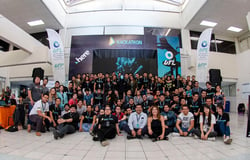Join the dynamic team at Kumo Experiences and play a pivotal role for launching new product features to deliver a world class experience for performing machine learning over relational databases. We are looking for individuals with strong customer focus and who can take on the full spectrum of product user experiences. You will be part of the team reinventing how to interface with complex AI backends and set the foundation for how we build robust, scalable, and delightful experiences on the cloud. You will work closely with the product team to define requirements, build high-quality software design, code and unit and integration tests.
Embark on a groundbreaking journey with Kumo to revolutionize how machine learning is done on relational data. Our platform enables creating state-of-the-art models without the need for intricate and manual feature engineering, by harnessing the power of Graph Neural Networks which automatically learn features on large scale data. All of this is abstracted behind a few lines of Predictive Query describing your prediction problem.
Come and change the way the world does AI with Kumo!
Key Responsibilities:
- As a Software Engineer at Kumo.AI, you will be responsible for shaping the development and success of our product, which is focused on enabling users across the enterprise, regardless of Machine Learning (ML) background, to build and deploy predictions in production.
- You'll be closely working with leadership and be responsible for defining customer user journeys, driving the product roadmap, collaborating with cross-functional teams, and ensuring the timely delivery of major features and solutions that meet customer needs on a per-release basis.
- You will be responsible for designing clean and elegant frameworks to help solve large scale problems, writing high quality code and tests and performing code reviews.
Minimum qualification:
- BS (preferred MS, Ph.D.) in Computer Science or related technical field involving coding (e.g., physics or mathematics), or equivalent technical experience.
- Experience designing backend APIs, database schemas, and backend microservices to power a sophisticated user-facing product.
- Experience writing clean JavaScript code including experience with modern frameworks (React) and debugging tools (Chrome Dev Tools, etc.)
- Knowledge of (and a passion for) current trends and best practices in full-stack architecture, including performance, accessibility, security, and usability.
- Experience with Test Driven Development
- 3+ years of industry experience.
Ideal:
- Past experience with launching SaaS products or working in Enterprise companies.
- Working knowledge of OAuth, identity and access management.
- Be highly data-driven, knowing how to acquire, comprehend, and effectively utilize data for making optimal decisions.
- Have 5+ years of relevant experience as a SWE.
- Effective communication with the leadership and the rest of the team.
- Basic understanding of machine learning and AI.
Qualifications:
- Strong analytical and problem-solving skills.
- Excellent communication and collaboration abilities.
We are an equal opportunity employer and value diversity at our company. We do not discriminate on the basis of race, religion, color, national origin, gender, sexual orientation, age, marital status, veteran status, or disability status.
Top Skills

What We Do
Democratizing AI on the Modern Data Stack!
The team behind PyG (PyG.org) is working on a turn-key solution for AI over large scale data warehouses. We believe the future of ML is a seamless integration between modern cloud data warehouses and AI algorithms. Our ML infrastructure massively simplifies the training and deployment of ML models on complex data.
With over 40,000 monthly downloads and nearly 13,000 Github stars, PyG is the ultimate platform for training and development of Graph Neural Network (GNN) architectures. GNNs -- one of the hottest areas of machine learning now -- are a class of deep learning models that generalize Transformer and CNN architectures and enable us to apply the power of deep learning to complex data. GNNs are unique in a sense that they can be applied to data of different shapes and modalities.










